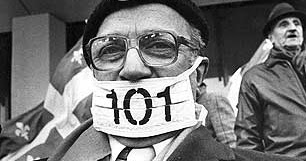Taking their cue from the Legault government’s fresh interest in the status of the French language now that it believes the secularism debate has cooled, the main opposition parties stepped up to say they too want action.
QUEBEC — Goodbye, secularism. Hello, language wars.
Taking their cue from the Legault government’s fresh interest in the status of the French language now that it believes the secularism debate has cooled, the main opposition parties stepped up to say they too want action.
In other words, nobody wants to surrender the vote-rich language theme to the Coalition Avenir Québec government when all parties are fighting for the same nationalist voters.
While the Parti Québécois said it has never stopped pushing for tougher language laws because it’s part of the party’s DNA, the Liberals surprised observers in saying they agree it might be necessary to re-examine the Charter of the French Language.
“We are not in any way closed (to this idea),” interim Liberal leader Pierre Arcand told reporters at a news conference Thursday to announce he has named veteran Liberal MNA Marc Tanguay as house leader. “The only thing is that it has to be done without denying someone’s rights.
“That’s the big difference between ourselves and the CAQ. The CAQ has been denying rights in some of the laws that they have presented.”
Arcand was not more specific about any changes he would like to see to the charter, but noted François Legault wasn’t specific either on Wednesday when the premier refused to rule out a reopening of the charter.
Announcing a cabinet shuffle, Legault said he promised Quebecers a nationalist government, which to him means one built on three pillars: state secularism, the French language and culture.
“That’s always the problem with Mr. Legault,” Arcand said. “It’s a government of rough drafts. It’s a government that likes to make sweeping, spectacular statements, but is short on substance.”
In Valleyfield for a pre-session planning caucus, Pascal Bérubé, interim leader of the PQ, also expressed skepticism about the CAQ government’s commitment to the issue, which he said has come out of the blue.
When the PQ minority government tried to toughen the charter via Bill 14 in 2013, the CAQ opposition refused to support the measure, saying it would create too much red tape for Quebec businesses.
Bérubé said he is not particularly worried about the CAQ mowing the PQ’s lawn on the theme, either.
“The question is, why didn’t this interest the CAQ before yesterday?” Bérubé asked at a news conference. “Why wasn’t it an issue when they were in the opposition and we were in power? Why was it not an issue last spring?
“It strikes me more as being a matter of tactics than real conviction.”
Bérubé challenged the CAQ to put its money where its mouth is.
“After a spring devoted to secularism, Quebec is ready to experience a French-language autumn,” Bérubé said.
He then announced language will be the party’s priority issue when the legislature reconvenes Sept. 17.
Unlike the CAQ, which has said it wants to focus first on incentives to improve French training for immigrants, the PQ wants the government to dive whole hog into the language question.
Bérubé outlined a series of measures, such as applying the charter’s francization requirements to small businesses with 25 to 49 employees as well as federal institutions such as banks.
He said the government should make French courses obligatory for new arrivals starting the day they set foot in Quebec. And he wants the government to put into action clauses of Bill 104 stating the government must communicate with businesses only in French.
“The French language deserves better than just cosmetic modifications,” said Bérubé.
He also attacked the CAQ’s idea of separating the issue of language from culture. In the cabinet shuffle announced Wednesday, Legault transferred responsibility for French away from Culture and Communications Minister Nathalie Roy and into the hands of Immigration Minister Simon Jolin-Barrette.
“The French language is an essential part of Quebec culture and our national identity,” Bérubé said.
But minority groups, which already feel overlooked by the CAQ government, are much less excited at the prospect of a new language debate in Quebec.
“This is a pattern of inventing problems and then spending a lot of time and energy on socially disruptive actions to create divisions and frustrations where we don’t need them,” said Geoffrey Chambers, president of the Quebec Community Groups Network, the province’s largest English-language advocacy group.
“It’s very worrying. There’s some part of (Legault’s) constituency that responds well to these kinds of signals.
“We really don’t have a language problem in Quebec right now. French has to be promoted and protected, and positive devices to do that will get nothing but our support.
“But suppressing English … and I heard (Legault) say yesterday that he thinks English is a threat. Well, it’s not a threat. English is an asset. The English-speaking population is an asset. The bilingualism of the francophone population is an asset.”

























